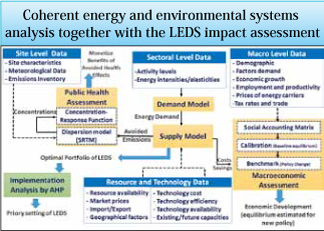学際的アプローチで長期スパンでの環境エネルギー問題を解決する戦略を探る
環境エネルギーシステム学研究室 ファルザネ フーマン (FARZANEH Hooman) 准教授

The research projects in the laboratory of Energy and Environmental Systems (EES) focus on identifying strategies and policies that could facilitate solutions for the long term energy-related problems-including global energy supply and environmental challenges facing our society. We pursue this goal through developing analytical methods and using computational models in order to understand the role of science and technology in shaping better energy and environmental policies at all levels. Students with diverse backgrounds (i.e. engineering, energy economics, environmental science, etc.) conduct research on designing an appropriate decision making framework that evaluates future scenarios from both “macro and micro” perspectives, which can be used to realize a sustainable energy system for Japan, Asia and even the world. EES multidisciplinary students work not only on technological solutions, but also on the economic, political, and social aspects associated with their realization. Our main themes of research are:
1. Modeling and simulation of the energy systems:
We design and develop computerized models covering the areas of Energy, the Economy and the Environment. Such models are used to make long-term projections and analyze complex issues requiring system-wide consideration, by applying following methodologies:
- Econometric models for causality between economic growth and energy demand.
- Optimization models for technology assessment at market level and supply system.
- Multi-criteria (E3) models for interaction between the Economy, the Energy system and the Environment.
- Simulation models for simulating the autonomous energy supply and demand systems.
2. Impact assessment of Low Emission Development Strategies (LEDS) in urban areas:
We develop a new analytical framework for conducting regular synthesis and assessment of the multiple benefits of LEDS on four main areas of energy, environment, public health and local economy, together with the implementation analysis of those policies, across the drivers/barriers and adaptation issues in cities.

3. Techno-Economic Analysis (TEA) for balancing economics and sustainability:
TEA requires experience and knowledge of both process and financial modeling. We utilize TEA as a decision-making tool to evaluate available clean energy technology options based on technical, economic, environmental criteria. A variety of technology options can be considered in this study, such as:
- Grid-tied and off-grid renewable energy technologies (i.e.solar, wind, geothermal, etc.)
- Innovative Hybrid Renewable Energy Systems (HRES)such as solar-hydrogen-biomass system
- Cleaner fossil energy and carbon capture technologies.
- Smart Grid and Demand Response Technology.







